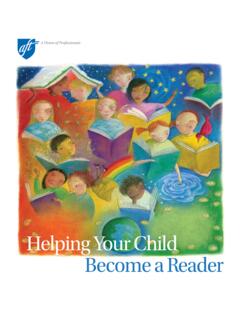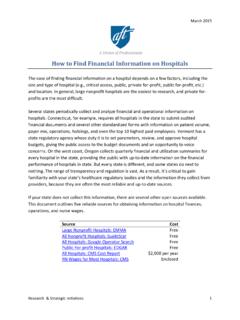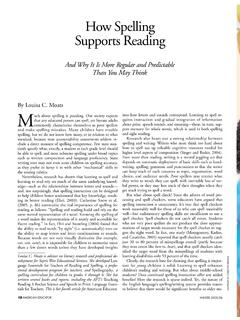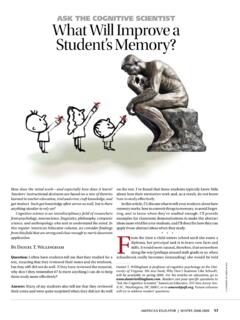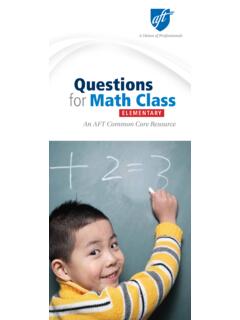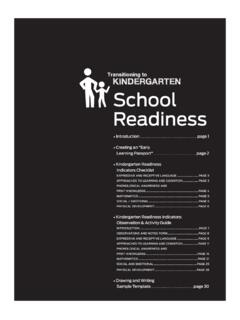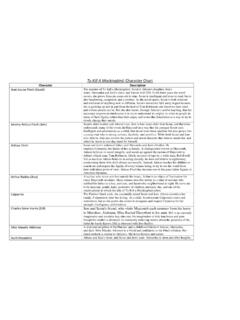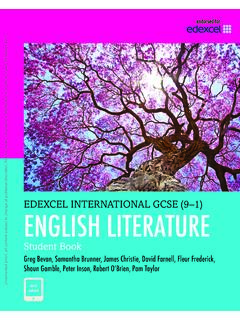Transcription of Teaching Reading Is Rocket Science, 2020
1 Teaching Reading Is Rocket Science, 2020 By Louisa C. MoatsWhat Expert Teachers of Reading Should Know and Be Able to DoRandi WeingartenpresidentLorretta Johnsonsecretary-treasurerEvelyn DeJesusexecutive vice presidentOUR MISSIONThe American Federation of Teachers is a union of professionals that champions fairness; democracy; economic opportunity; and high-quality public education, healthcare and public services for our students, their families and our communities. We are committed to advancing these principles through community engagement, organizing, collective bargaining and political activism, and especially through the work our members American Federation of Teachers, AFL-CIO (AFT 2020). Permission is hereby granted to AFT state and local affiliates to reproduce and distribute copies of the work for nonprofit education purposes, provided that copies are distributed at or below cost, and that the author, source, and copyright notice are included on each copy. Any distribution of such materials to third parties who are outside of the AFT or its affiliates is prohibited without first receiving the express written permission of the C.
2 Moats, , has been a teacher, psychologist, researcher, graduate school faculty member, and author of many influential scientific journal articles, books, and policy papers on the topics of Reading , spelling, language, and teacher preparation. Dr. Moats spent 15 years in private practice as a licensed psychologist in Vermont, specializing in evaluation and consultation with individuals of all ages and walks of life who experienced Reading , writing, and language difficulties. She has also served as a site director of the National Institute of Child Health and Human Development s Early Interventions Project and research advisor and consultant with Sopris Learning. Dr. Moats is most well known for her research and writing about the need for improvements in teacher education. Her more recent publications have focused on helping teachers understand the language basis for Reading and writing. They include LETRS Professional Development (Voyager Sopris), LANGUAGE! Live blended literacy intervention (Voyager Sopris), and Speech to Print: Language Essentials for Teachers (Brookes Publishing).
3 ILLUSTRATIONS BY JING JING TSONGT eaching Reading Is Rocket Science, 2020 | 1 Table of ContentsForeword: For the Love of Reading ..2By Randi WeingartenExecutive Summary ..4 Preface ..6 Increasing Reading Achievement and Preventing Reading Failure: A Top Priority ..8 Where We Are: Research-Validated Ideas That Should Drive Instruction ..9 Where We Are: Taking Stock of Teacher Preparation in We Do Better? ..13 Toward a Curriculum for Teacher Preparation and In-Service Professional Development ..14 Reading Psychology and Development ..14 Language Structure ..17 Best Practices ..20 Assessment That Informs Teaching ..21 Where We Need to Go: Changing Teacher Preparation and Professional Development ..23 Endnotes ..26 Appendix ..282 | American Federation of TeachersForeword: For the Love of ReadingRandi Weingarten, AFT PresidentI love to read, although these days I do much of it on a computer screen. As a child I remember my mother, who was a second-grade teacher, always making sure we had books at home books like The Hundred Dresses by Eleanor Estes, The Jazz Man by Mary Hays Weik, and The Story of Ferdinand by Munro Leaf.
4 Books I read as a teenager shaped my quest for justice and the fight against dis-crimination books like Anne Frank s The Diary of a Young Girl and Harper Lee s To kill a mockingbird . And I will always be mes-merized by Emma Lazarus iconic poem, The New Colossus with such lyrical language as The wretched refuse of your teeming I lift my lamp beside the golden door! Even as much of my time is devoted to fighting for our members, our students, and our communities, I try to make time for Reading . Whether it s for work or for pleasure, I read to stay informed, to spark new ideas, to renew my spirit, and to better understand others perspectives. I can t imagine my life without the written word and I m grateful to the teachers, including my mother, who gave me the gift of Reading when I was is not simply a desire; it is a fundamental skill necessary for virtually everything we do. And we need to ensure all of us, particu-larly our children, learn to read and read to learn so they too can do everything.
5 That s why the AFT is pleased to update and repub- Teaching Reading Is Rocket Science, 2020 | 3lish Teaching Reading Is Rocket Science, 2020: What Expert Teachers of Reading Should Know and Be Able to Do. This report, written by Louisa C. Moats (a teacher, psychologist, researcher, and professor who has been at the forefront of science-based Reading instruction for five decades), translates the latest Reading research into acces-sible language so that those of us who are not steeped in the peda-gogy of Reading can apply it to our own Teaching and me tell you what the report does and doesn t do. It doesn t get us back into the Reading wars, and it doesn t advocate for what we have found so disrespectful: scripted curricula or teacher proof programs. It does detail the expert-level knowledge of language necessary to teach Reading , and it does support teachers in building that disseminating effective practices grounded in research, everyone has a role to play. From teacher-preparation programs to school systems, from state officials to curriculum developers, we must move quickly to revamp the guidance and resources provided to educa-tors.
6 But I m betting on our nation s teachers. As a profession, we have the drive and the passion to do the hard work of understand-ing and using the science of Reading . And it is hard work, much harder than it should be since so few of the education publishers and professional development providers have cast aside their profitable-but-outdated materials and programs to create new resources that reflect the latest current state of Reading research understands the importance of teacher professionalism and autonomy. Embracing the science is, fundamentally, about giving teachers the freedom to teach. Teachers hearts break when students struggle to decipher words on a page and explain what they mean. Desperate to support those students, teachers spend countless hours searching online to supplement the inadequate materials and training they have been given. So much of what sounds persuasive on paper just doesn t work well in the classroom or works well only for stu-dents who most easily master the art and science of Reading .
7 This report tries to fill that , who has dedicated her career to struggling readers, wrote the first version of Teaching Reading Is Rocket Science, which the AFT published in 1999. In it, she explained how children learn to read, the essential components of Reading instruction, what causes Reading difficulties and how to prevent or reduce them. In this new edition, she adds depth to the science and provides clarity on the challenge before us: taking action. Teaching Reading really is Rocket science. Academic English is complex. Given this complexity, children need carefully planned instruction to become fluent readers, spellers, and writers. And, because of the enormous inequities in our society, providing each child an equitable opportunity to revel in an abundance of books in which they both see themselves and are introduced to the world is no small , there is joy in this work whether Reading aloud stories and poems that delight young and old, or introducing the wonder of new words and ideas to children.
8 Ultimately, the science of read-ing is inextricably linked to the love of Reading . To teach and inspire the next generation, we simply can t have one without the science of Reading is inextricably linked to the love of Reading . To teach and inspire the next generation, we simply can t have one without the | American Federation of TeachersExecutive SummaryThe most fundamental responsibility of schools is Teaching students to read. Because Reading affects all other academic achievement and is associated with social, emotional, economic, and physical health, it has been the most researched aspect of human cognition. By the year 2000, after decades of multidisciplinary research, the scientific community had achieved broad consensus regarding these ques-tions: How do children learn to read? What causes Reading difficul-ties? What are the essential components of effective Reading instruction and why is each important? How can we prevent or reduce Reading difficulties?
9 Two decades later, hundreds of additional studies have refined and consolidated what we know about bolstering Reading achievement, especially for students at risk. Unfortunately, much of this research is not yet included in teacher preparation programs, widely used curricula, or professional devel-opment, so it should come as no surprise that typical classroom practices often deviate substantially from what is recommended by our most credible sources. As a result, Reading achievement is not as strong as it should be for most students, and the consequences are particularly dire for students from the least advantaged families and communities. This we know: Reading failure can be prevented in all but a small percentage of children with serious learning disorders. It is possible to teach most students how to read if we start early and follow the significant body of research showing which practices are most effec-tive. Students living in poverty, students of color, and students who are eligible for remedial services can become competent readers at any age.
10 Persistent gaps between more advantaged and less advan-taged students can be narrowed and even closed. Fundamentally, these gaps are the result of differences in students opportunities to learn not their learning educators have long understood the importance of literacy, Teaching children to read is very complex. Far too many children have trouble Reading and writing. About 20 percent of elementary school students nationwide have serious problems learning to read; at least another 20 percent are at risk for not meeting grade-level expecta-tions. For children growing up in underresourced communities and attending underresourced schools, the incidence of Reading failure is astronomical and completely unacceptable. Students who are This report is an update to the original Teaching Reading Is Rocket Science published by the American Federation of Teachers over 20 years ago and emerges from a collaboration between the AFT and the Center for Development and Learning. Together they acknowledge that, although some progress has been made in Teaching Reading effectively, too few at-risk, disadvantaged, and minority students become proficient readers.
